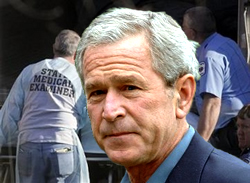 The War precedent
The War precedent
| LATEST JOURNALS |
| 10-Jan-2006 Park City 01-Jan-2006 First Step 29-Dec-2005 '05 & '06 09-Dec-2005 Victory 02-Dec-2005 Cold Dead Hand 14-Nov-2005 High on China 07-Nov-2005 Vote 06-Nov-2005 Clinton |
![]()
![]() e claims to be a uniter, not a divider. He's filled with compassion. There was a man in the White House, not so long ago, who didn't make the claim but who met the requirements. He was an original thinker, a good leader and was internationally respected: Bill Clinton.
e claims to be a uniter, not a divider. He's filled with compassion. There was a man in the White House, not so long ago, who didn't make the claim but who met the requirements. He was an original thinker, a good leader and was internationally respected: Bill Clinton.
![]() For comparison, and as an example of what I mean, the accident that took the lives of twelve miners at the Sago, West Virginia mine, happened against a background of real deregulatory zeal espoused by the Bush administration. Most of the safety regulations proposed during the 8 Clinton years were dropped by President Bush almost as soon as he came into office. We don't know yet and it may take a long while to discover, whether this man's passion for deregulation and lax treatment of mine safety violations played any substantive role in the disaster. I wonder what the findings will be. The Bush administration has gone out of its way to forge a cooperative relationship between the mine bosses and the safety administration. We know whose side the Bushies are on.
For comparison, and as an example of what I mean, the accident that took the lives of twelve miners at the Sago, West Virginia mine, happened against a background of real deregulatory zeal espoused by the Bush administration. Most of the safety regulations proposed during the 8 Clinton years were dropped by President Bush almost as soon as he came into office. We don't know yet and it may take a long while to discover, whether this man's passion for deregulation and lax treatment of mine safety violations played any substantive role in the disaster. I wonder what the findings will be. The Bush administration has gone out of its way to forge a cooperative relationship between the mine bosses and the safety administration. We know whose side the Bushies are on.
![]() The Supreme Court put it this way back in 1972 when they noted that the "Fourth Amendment freedoms cannot properly be guaranteed if domestic security surveillances may be conducted solely within the discretion of the Executive Branch." We have a president who has adopted the Nixon approach saying, in so many words, "I am the Commander in Chief; I am responsible for the security of this country; the people expect me to do this; and I'm going to do it." (A quote from Time magazine). But, if you remember, the Supreme Court contradicted Richard Nixon when he made the same point in 1972. And the Supreme Court took issue with the Chief Executive, George W. Bush when he asserted, after 9/11 that he had the authority to indefinitely detain those he unilaterally deemed "enemy combatants", without any access to a court.
The Supreme Court put it this way back in 1972 when they noted that the "Fourth Amendment freedoms cannot properly be guaranteed if domestic security surveillances may be conducted solely within the discretion of the Executive Branch." We have a president who has adopted the Nixon approach saying, in so many words, "I am the Commander in Chief; I am responsible for the security of this country; the people expect me to do this; and I'm going to do it." (A quote from Time magazine). But, if you remember, the Supreme Court contradicted Richard Nixon when he made the same point in 1972. And the Supreme Court took issue with the Chief Executive, George W. Bush when he asserted, after 9/11 that he had the authority to indefinitely detain those he unilaterally deemed "enemy combatants", without any access to a court.
![]() Here's a line which well describes one of many real concerns that comes about as a result of such actions. It comes from a Republican former member of the House of Representatives from 1995 to 2003, Bob Barr. He wrote, "If Bush succeeds in establishing this as a precedent, he will have accomplished a breathtaking expansion of unilateral Executive power that could be easily applied to virtually any other area of domestic activity as long as a link to national security is asserted."
Here's a line which well describes one of many real concerns that comes about as a result of such actions. It comes from a Republican former member of the House of Representatives from 1995 to 2003, Bob Barr. He wrote, "If Bush succeeds in establishing this as a precedent, he will have accomplished a breathtaking expansion of unilateral Executive power that could be easily applied to virtually any other area of domestic activity as long as a link to national security is asserted."
![]() He designated himself "The War President." He's better suited as "The eavesdropping president."
He designated himself "The War President." He's better suited as "The eavesdropping president."
Michael |
||
Michael Jackson Talk Radio
Official site of 2003 Radio Hall of Fame inductee,
7 time Emmy Award winning, 4 time Golden Mike Award winning, Talk Radio
Host.
Listen to interviews with Michael Jackson on KNX1070 AM
on Iraq, the Bush administration,
Corporate Criminals, the Economy, and the up coming 2008 election.
visitors since December 11, 2002 Copyright © Michael Jackson
2006 all rights reserved.
http://www.michaeljacksontalkradio.com
Site
Design, Hosting and Animation
Illuminary
Arts
